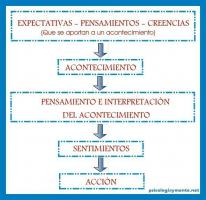This is performance anxiety in social interactions
The social contexts in which we communicate with people we do not know well provide us with so much learning that we need to face in our day to day as new opportunities and the possibility of establishing collaborations and alliances essential for our quality of life. It is in our nature to regularly interact with all kinds of people, since this is necessary to live in society without experiencing problems.
However, some people experience feelings of anxiety or stress at the mere idea of having to interact socially with a person or group of people, whatever the context. And this not only produces discomfort; it also leads these individuals to engage in self-harming, self-sabotaging behavior patterns.
Performance anxiety is one of the most common phenomena in those people who in these social interactions as a significant challenge for the which must be prepared mentally in order to achieve a series of goals in each conversation, in each exchange of gestures or presentation before unknown. here we will see
what are the problems derived from performance anxiety applied to social situations.- Related article: "What is anxiety: how to recognize it and what to do"
What is performance anxiety in social interactions?
Social performance anxiety, by itself, is the dynamic of anticipatory anxiety at the idea of having to perform a complex task that tests our abilities and probably exceeds them. In other words, it is what we feel when we automatically and unconsciously we generate and reinforce in ourselves the idea that we will not be able to achieve a goal that we have set for ourselves.
On the other hand, when we speak specifically of performance anxiety in social interactions, we are referring to the set of anxious reactions that experiences a person before the forecast of having to interact with other people in the short or medium term, seeing these communicative exchanges (verbal or not verbal) as a very difficult or unreasonable job in which several goals have to be achieved that are too ambitious for the social skills of which has.

These social interactions can be of any kind and generate a feeling of intense discomfort in the person. that presents difficulties to relate, since it usually anticipates all kinds of unpleasant scenarios and negatives. And for this reason, the phenomenon of the self-fulfilling prophecy appears: the anticipation that we will fail when communicating with someone puts us in a situation of vulnerability that weighs us down and increases the chances that this experience will be less fluid and full of potholes
Some of the scenarios that can generate cases of performance anxiety are usually job interviews, conversations with a neighbor to ask for an object, meetings with people we have met on the Internet, family reunions or the fact of knowing the parents of our partner.
In either case, the person will always experience feelings of anxiety before the interaction takes place. with other people and this psychophysiological reaction is usually linked to a phenomenon known as the prophecy self-fulfilling
- You may be interested: "Extreme shyness: what it is, causes, and how to overcome it"
What is the self-fulfilling prophecy?
The self-fulfilling prophecy consists of anticipating negative events or catastrophic events without that these have still occurred and without there being any objective evidence to consider that they are going to happen.
People who present performance anxiety before social interactions usually put into practice a model of thought based on prophecy self-fulfilling, that is, the fear of feeling anxiety in the face of any social interaction, ends up generating that same excessive anxiety once the time has come to interact.
For example, before the celebration of a family reunion, a person may begin to feel anxious days before it occurs and you will feel more anxiety the closer the date of the celebration is.
In addition to that, shortly after meeting with his relatives, he will begin to imagine negative scenarios in which he will see himself. having a hard time during the meeting and he will also imagine all kinds of negative thoughts that his relatives may have about him same.
The self-fulfilling prophecy is that all these fantasies and unpleasant scenarios that the person imagines, end up being fulfilled, and your fear of anxiety ends up coming true.
- Related article: "Self-fulfilling prophecies, or how to carve out a failure yourself"
Symptoms of performance anxiety in social interactions
There are many characteristics of performance anxiety triggered by social situations, and its symptoms are also varied and depend on each person; however, there are some features common to most people who have this alteration.
1. Cognitive symptoms
The psychological symptoms that most people with this disorder present are states of intense anxiety that can vary depending on the stimulus they face. They are based on catastrophic predictions of what will happen when we communicate with someone, something that makes it difficult to focus in that experience from a constructive mentality and oriented to the real goals that lead us to interact socially.
Part of the fears that people with social performance anxiety have is fear of being judged or ridiculed, the fear that others may think badly of oneself or the fear that others will notice one's own anxiety.
In addition to more or less constant anxiety, it is also common to present high levels of fear, agitation or embarrassment at the possibility of participating in any situation in which it is necessary to interact with others people.
- You may be interested: "Cognition: definition, main processes and functioning"
2. behavioral symptoms
Some of the most common behavioral symptoms are the progressive avoidance of all kinds of social interactions, which ends up causing the person to see all kinds of relevant social ties damaged.
Another of the usual behavioral symptoms can be staying quiet in social situations, or drinking alcohol to lose inhibitions or to lose fear and embarrassment, or directly wasting more time than usual to postpone or avoid those social interactions (for example, going around the corner when returning from worked).
3. physical symptoms
Physical symptoms are usually tremors, excessive sweating, flushing, or a trembling voice.
All of these physical symptoms can also cause a person to feel increasingly anxious, less self-confident, and more aware of whether or not they are transmitting anxiety.
4. Overanalyze after an interaction
Another of the main characteristics that may indicate a case of social anxiety is the fact that overanalyze oneself after a given social interaction, with the intention of identifying all kinds of own faults.
This habit ends up becoming systematic after participating in any social setting and the fact of constantly thinking about our own mistakes and what we could have failed in ends up undermining the person's mental health.
- Related article: "Rumination: The Annoying Vicious Circle of Thinking"
The importance of going to psychotherapy
Psychological therapy is the most effective context in which to learn to manage anxiety.
If you are interested in having this type of psychological assistance, please contact me.

